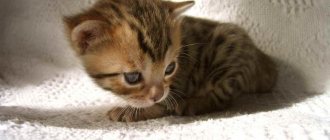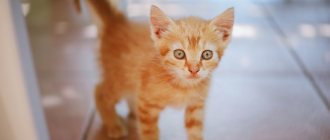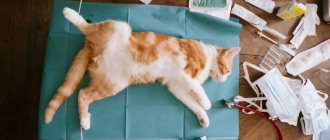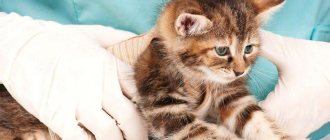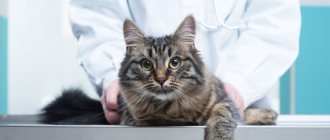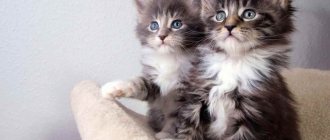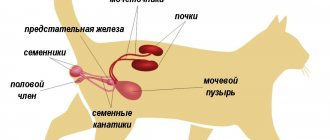Are you currently caring for a newborn kitten? If you are a new kitten parent, a breeder, or anyone else who is currently around kittens, then it is of course very important to know the answer to the question “when do kittens start to poop.” There's a lot of information you need to hide about your kitten beyond his bathroom breaks to make sure he grows up happy and healthy.
In this post, we'll talk about when kittens start pooping and the specific reasons why cats do this behavior.
Acts of bowel movements and urination at different ages
A healthy kitten visits the restroom often. The health of the kitten depends on the number of visits, so it is important for a loving owner to monitor the rhythm of visiting the toilet. It is also important to find out what measures should be taken if the kitten “keeps everything to himself.”
Newborn kittens
In the first 3 weeks after birth, the mother cat helps her kittens with going to the toilet. By licking them according to the call of instincts, she cleanses babies of dirt, bad odors and activates blood circulation in the digestive organs. Massaging the mother cat helps the kittens get rid of gas and “do their job” - defecate.
If there is no mother cat nearby, the owners become responsible to the kitten. They should stroke the baby every 2 hours before and after meals.
A tiny kitten may refuse to defecate. Gases accumulate in a bloated tummy, and certain manipulations will help eliminate them:
- the owner takes cotton wool;
- wets it in water at room temperature;
- massages the baby's tummy clockwise with it.
Period
By the 3rd week after birth, the kitten is ready to accept more adult food: its intestines are formed and have beneficial microflora. Even if the baby is still feeding on mother cat's milk, you can start introducing liquid food into his diet. At the 3rd week, the reflex of urination and defecation has already been formed, so the kitten goes to the toilet every 4-6 times a day.
Normal bowel movements:
- mushy appearance;
- uniform and thick;
- do not have impurities (for example, undigested pieces of food).
The kitten is energetic and perky. If the stool is liquid or very dry, this is a reason to think about visiting a veterinarian.
You can try massaging in a circular motion. Since there is no mother nearby, responsibility for the baby’s health falls on the owners.
Adults
From 1 to 3 months, the kitten can already switch to adult food. During this period, you should no longer be afraid if the feces are hard - that’s how it should be. The consistency of stool and the regularity of going to the toilet during this period is an individual matter.
A kitten eating food with a high fiber content goes to the toilet more often.
Grown-up kittens go to the toilet regularly and the feces of a healthy pet should not contain undigested food or strange mucus.
Why does a kitten have problems with stool?
Newborn animals have difficulty defecating if the cat does not care for them properly. Problems can also arise in cases where kittens are cared for by humans, if the owner does not follow the rules. After feeding, it is necessary to massage the belly and groin area; To do this, it is recommended to use cotton swabs with soft bristles.
Older kittens fed solid food may suffer from digestive problems for several reasons.
Severe stress can cause constipation.
If the kitten has recently been separated from its mother, moved to a new place of residence, a visit to the veterinarian, or aggression from another animal can cause severe nervous tension, due to which bowel movements will temporarily disappear. Most often, the duration of absence of stool in such a situation does not exceed 2-3 days.
Early weaning from the cat is possible.
In such a situation, the cub greatly misses its mother and lacks her company. There may be no stool for up to 4-5 days, after which the small cat must poop. The situation is considered normal. You should be wary if bowel movements do not begin even after.
Errors in diet planning.
A sudden change in diet or excessive amounts of protein foods often leads to constipation.
Constipation occurs in animals infected with helminths.
Due to parasites, the functioning of the gastrointestinal tract is disrupted, which leads to intestinal blockage and deterioration of peristalsis. At the same time, the animal constantly scratches its butt on the carpet or other rough surface and may become too restless.
Deviations from the norm in the toilet: causes of the disease
It happens that a kitten has an abnormal frequency of urination. They are divided into 2 cases: safe and incorrect.
The first include:
- acclimatization;
- menu changes;
- stress caused by adopting or adding a new pet to the family;
- operations: sterilization or castration.
The factors listed above are only temporary difficulties. After adaptation, everything returns to normal.
There are also more serious reasons. If urination brings pain to the animal or urine is released in limited quantities, this is an alarming sign.
Pathologies are cases when:
- there is mucous secretions or blood in the urine;
- limited discharge;
- heat;
- bloated tummy;
- plaintive meowing during bowel movements;
- inability to urinate;
- hot ears;
- dry nose;
- lethargy, reluctance to eat your favorite food.
You can tell that a pet is sick by its condition. The animal sits in an unnatural position:
- the animal's body is hunched;
- muscles are tense;
- the back is arched.
At the same time, the animal may cry pitifully. The kitten may also refuse to go to the toilet if the tray has not been washed for a long time or if it is dissatisfied with the litter.
How often should a 3-4 month old baby pee and poop?
As kittens get older, the frequency of bowel movements and bladder movements decreases. A 3-4 month old healthy baby should have bowel movements twice or thrice a day, and urination 5-6 times. These are conditional figures. As noted earlier, the frequency of visiting the toilet depends on the amount of fluid consumed and dietary habits. How often a small pet urinates is also affected by its gender. Females and males visit the litter box to empty their bladder with different frequencies. The former do this less often, the latter somewhat more often.
How to train a kitten to use a litter tray?
So, we found out when kittens begin to go to the toilet on their own, now let’s figure out how to accustom the little ones to the litter box. Of course, everyone who is faced with the issue of training wants to receive win-win advice, but all animals are different and approaches to them differ. Let's try to highlight the main methods:
- Tank training. This point is the first and easiest. The baby just needs to see his tray and understand what the owner wants from him. You can hurry up the kitten by massaging its tummy with light movements. A kitten that has gone to the toilet once in the right place will most likely return to the same place. After each visit to the toilet, it is advisable to lightly clean the tank - it should not smell bad. Cats are clean animals, and if they refuse a tray or bowl of food, then they are dirty.
- Several trays. You can try a clever trick - place several trays around the house in different corners (or in a place the predator likes). When kittens start going to the toilet in one of the places prepared for them, they get used to it and will come back. All that remains is to remove the extra trays. Do not forget that the animal does not get used to the tank, but to the place.
- Moving around the house. It is worth following where the baby will go after the meal. If he starts to worry and hesitate, you can safely put him in the tray. After the “deeds are done,” the baby needs to be petted - this will let him know that he did the right thing, and as a bonus, give him a treat.
- Attractive methods. Special luring agents can accustom a kitten to the litter tray - that’s what they’re called. You can also use the scent of valerian or catnip.
Expert opinion
Dusheba Vera Ivanovna
In 2010, she graduated from the Moscow State Academy of Veterinary Medicine named after K.I. Scriabin with honors, specializing in veterinary medicine. I regularly attend veterinary conferences, congresses, and webinars.
Kittens themselves notify their owners of their desire to go to the toilet. As a rule, they begin to meow and look for a secluded place. If the baby begins to defecate in the wrong place, he needs to be placed in a tray. But the kitten should not be afraid - screaming and teaching are completely inappropriate.
Breastfeeding kittens are unlikely to understand what is being asked of them. Up to a certain point, the mother cat herself takes care of cleaning up the waste products of her cubs, so the baby will need more time to master it. There is no need to scold the kitten.
Causes of constipation in cats
We should find out what is cat constipation from a scientific point of view, its symptoms and why does it occur? As food is processed, it passes through multiple sections of the intestine and whatever remains is deposited in the rectum, forming feces. With constipation, they become so dense that they cannot come out. Decay products, stagnating, begin to be absorbed into the body, poisoning the internal organs, disrupting their activity.
Symptoms of constipation
When a cat, cat or kitten doesn't poop, their behavior and well-being change greatly. Symptoms of constipation include the following:
- when palpated, the cat’s belly swells slightly and becomes hard,
- the animal experiences discomfort
- loses appetite
- the cat or kitten is straining, but cannot go to the toilet,
- sometimes accompanies digging of sand in a tray with a plaintive cry.
There is no need to describe the whole sad picture of what is happening, given that there were cases of death.
What owner wouldn’t strive to help his four-legged pet?! To begin treatment or prevent such situations, you should know why they occur. So, the causes of constipation may be the following:
- Lack of proper and balanced nutrition. Feeding dry food is very common: it is convenient to store and use. But it should be remembered that it contains a large amount of carbohydrates, which stimulate increased urination, which removes useful substances along with unnecessary ones. Even if your cat always has a full bowl of water, you should not feed it only dry food. You should not get carried away with wet food (wet canned food): they do not contain sufficient dietary fiber for intestinal function.
- Presence of hairballs and foreign bodies in the stomach. This applies mostly to long-haired breeds. They constantly lick themselves, swallowing hairs, which then turn into lumps in the stomach. Normal digestion, feces formation and, accordingly, defecation are disrupted. Any cat can accidentally swallow small hard objects - threads, pieces of string, toys, small bones, which are not digested and create problems for bowel movements.
- Stressful situations, for example, experiencing fright from meeting a large dog, a long journey, etc. In these cases, constipation is situational in nature and passes quickly.
- Various diseases of internal organs. Felines, like humans, are susceptible to all sorts of ailments that can affect intestinal function. Frequent constipation should be of particular concern. Only a qualified doctor can determine the cause.
- Age and lack of mobility. Most often, constipation occurs in aging animals (although it also occurs in kittens), in those who move little and prefer to sit or bask while lying down. Usually playful, healthy cats that run and jump quickly do not experience problems with bowel movements.
How to avoid urinary problems?
Every loving owner wants his animal to be healthy and active. To avoid problems with urination, you should resort to preventive measures. If problems arise, it will not be easy to get rid of them.
Preventive measures:
- the kitten should be warm (hypothermia should not be allowed);
- the predator's menu should include only acceptable food products, and prohibited ones should be excluded (you can read the list of such products that you cannot feed cats or ask your veterinarian);
- drinking water should always be clean, and the cat should always have quick access to liquid;
- You need to play with the predator so that it remains active, because movement is life.
In case of problems with urination, you should find a good veterinarian in your city and consult with him.
From 3 weeks of age, kittens can already go to the toilet on their own, and as they grow older, trips should not exceed 10 times a day and be less than 5 times. By and large, the norm is 3 trips per day. If hikes deviate from the norm, this is a reason to think about it. The kitten should go to the toilet with ease and without pain. The main thing to remember is that the baby is just getting used to it, there is no need to put pressure on him. Soon he will understand where his toilet is.
When kittens begin to eat on their own: schedule for transition to “adult” food
Kittens are born toothless. The absence of teeth, the first of which erupt at 7–14 days of age (and the dentition is completely filled with them by 2 months), allows babies to feed only on mother’s milk. This continues during the first few weeks of life. Breast milk is important for babies. It contains microelements and antibodies that contribute to the formation of colostral immunity.
In the first days of life, kittens' diet consists of colostrum, which is eventually replaced by milk. Breastfeeding by a cat of its cubs lasts from 40 to 60 days. Sometimes it lasts up to 6 months. It is recommended to introduce the first complementary foods to babies at 3–4 weeks of age, since it is from this moment that the nursing pet’s milk production gradually decreases. The cubs can eat on their own after about 1 month.
Useful video
Get acquainted with interesting cat breeds with the help of our encyclopedia: Karelian Bobtail, Ragamuffin, LaPerm.
How many times should a cat go to the toilet, small and large?
How to train a kitten to use a litter tray?
Normal or constipated: how many days can a kitten go without bowel movements?
The transition to “adult” food, the need to defecate on its own without the help of the mother and litter box training - all these factors can lead to problems with bowel movements in the kitten. By how often he does this, you can determine whether he has difficulty defecating. We are talking about constipation if a small pet has not defecated for more than 2 days. If his large intestine is not cleared of its contents for more than 48 hours, irreversible processes begin in the baby’s body. Ignoring this problem can lead to the death of the baby.
